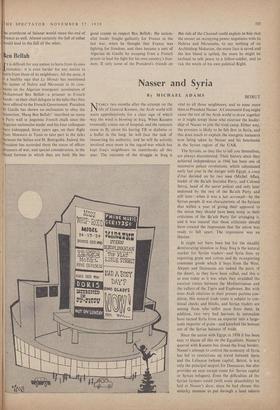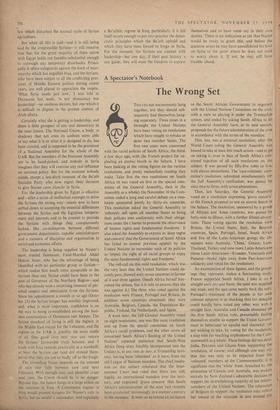Nasser and Syria
By MICHAEL ADAMS
BEIRUT NEARLY two months after the attempt on the life of General Kassem, the Arab world still waits apprehensively for a clear sign of which way the wind is blowing in Iraq. When Kassem eventually comes out of hospital, and the rumours cease to fly about his having TB or diabetes or a bullet in the lung, he will face the task of reasserting his authority, and he will be actively involved once more in the tug-of-war which has kept Iraq's neighbours on tenterhooks all this year. The outcome of the struggle in Iraq is vital to all those neighbours, and to none more than to President Nasser. A Communist Iraq might cause the rest of the Arab world to draw together or it might tempt those who mistrust the leader- ship of Nasser to join the rival camp. Either way,' the pressure is likely to be felt first in Syria, and this does much to explain the energetic measures now being taken by Nasser and his henchmen in the Syrian region of the UAR.
The Syrians, as they like to tell you themselves, are always discontented. Their history since they achieved independence in 1946 has been one of successive palace revolutions, which culminated early last year in the merger with Egypt, a coup d'etat decided on by two men (Michel Aflaq, leader of the Ba'ath Socialist Party, and Colonel Serraj, head of the secret police) and only later endorsed by the rest of the Ba'ath Party and still later7-when it was a fait accompli—by the Syrian people. It was characteristic of the Syrians that within a year of giving their approval to the union they should have been noisy in their criticisms of the Ba'ath Party for arranging it, and it was natural that those criticisms should have created the impression that the union was ready to fall apart. The impression was an illOsion.
It might not have been but for the steadily deteriorating situation in Iraq. Iraq is the natural market for Syrian traders—and Syria lives by exporting grain and cotton and by re-exporting consumer goods which it buys from the West. Aleppo and Damascus are indeed the ports of the desert, as they have been called, and this is as true today as it was when they straddled tha caravan routes between the Mediterranean and the valleys of the Tigris and Euphrates. But with inter-Arab relations in their present parlous con- dition, this natural trade route is subject to con- tinual checks and blocks, and Syrian traders are among those who suffer most from them. In addition, two very bad harvests in succession have turned Syria from an exporter into a large- scale importer of grain—and knocked the bottom out of the Syrian balance of trade.
Since the union with Egypt in 1958 it has been easy to blame all this on the Egyptians. Nasser's quarrel with Kassem has closed the Iraqi border; Nasser's attempt to control the economy of Syria has led to restrictions on travel between Syria and the Lebanon (whose capital, Beirut, is not only the principal seaport for Damascus, but also provides an easy escape route for Syrian capital or Syrian refugees). Even the difficulties of the Syrian farmers could (with some plausibility) be laid at Nasser's door, since he had chosen this unlucky moment to put through a land reform law which disturbed the normal cycle of Syrian agriculture.
But when all this is said—and it is still being said by the irrepressible Syrians—it still remains true that for the great majority of them union with Egypt holds out benefits substantial enough to outweigh any temporary drawbacks. Princi- pally it offers safeguards against the kind of near- anarchy which has engulfed Iraq, and the Syrians, who have been subject to all the conflicting pres- sures of Middle Eastern politics during recent years, are well placed to appreciate the respite. `What Syria needs just now,' I was told in Damascus last week, 'is not democracy but leadership'—an ominous dictum, but one which it is. difficult to dispute in the present context of Arab affairs.
Certainly what she is getting is leadership, and there is little prospect of any real democracy in the near future. The National Union, a body so shadowy that not even its authors seem able to 'say what it is or what it is designed to do, has been created, and is supposed to be the precursor of a National Assembly for the whole of the UAR. But the members of the National Assembly are to be hand-picked, and nobody in Syria imagines that they will exercise any real influence on national policy. But for the moment nobody minds, except a last-ditch remnant of the Ba'ath Socialist Party who now regret their 'decision to give Nasser carte blanche in Syria.
For the leadership given by Egypt is effective and—after a series of ineffectual attempts to drive the Syrians the wrong way—seems now to have settled down to accepting the essential differences between the Syrian and the Egyptian tempera- ment and interests and to be content to provide the Syrians with things they conspicuously lacked, like co-ordination between different government departments, capable administrators and a measure of discipline and organisation in social and economic affairs.
The leadership is being supplied by • Nasser's most trusted lieutenant, Field-Marshal Abdel Hakim Amer, who has the advantage of being identified with no particular group or faction— which makes him much more acceptable to the Syrians than any Syrian could have been in the post of Governor of the Northern Region—and who has already won a surprising measure of per- sonal respect and admiration from the Syrians. Since his appointment a month or so ago (Octo- ber 21) the Syrian temper has sensibly improved, and, what is most important, confidence is on the way to being re-established among the busi- ness communities of Damascus and Aleppo. The Syrian standard of living is still the highest in the Middle East except for the Lebanese, and the regime in the UAR is possibly the most stable of all. One good crop next year can restore the Syrians' favourable trade balance, and If trade with Iraq remains practically at a standstill, at , least the Syrians can (and do) remind them- selves that they are not so badly of as the Iraqis.
The immediate future depends on the amount of rain ' that falls between now and next February. With enough rain, and plentiful crops next year., the Union should be in no danger. Beyond that. the future hangs to a large extent on the outcome in Iraq. A Communist regime in Iraq would present dangers for Nasser's rule in Syria; but so would a nationalist, and especially a Ba'athist, regime in Iraq, particularly if it felt itself secure enough to put into practice the demo- cratic principles which the Ba'ath uphold and which they have been forced to forgo in Syria. For the moment, the Syrians are content with leadership—but one day, if their past history 's any guide, they will want the freedom to express themselves and to have some say in their omt destiny. There is no indication as yet that Nasser would be ready to grant this, and before the question arises he may have consolidated his hold on Syria to the point where he does not need to worry about it. If not, he may still have trouble ahead,



























































 Previous page
Previous page